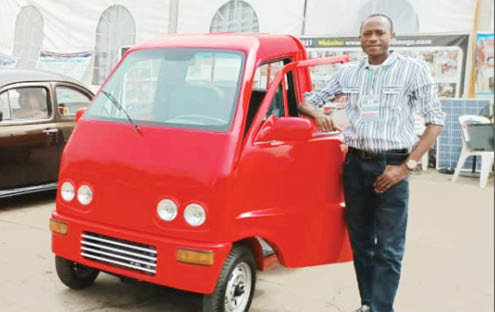Eghosa Igbinosa is a self-employed PhD student at the University of Benin (Uniben). In this interview, he shares his experience, challenges and what motivated him to construct a light truck, among others.
How did you construct the truck?
The development and construction of the vehicle commenced by deciding its type and purpose. Thereafter, sketches of the desired configuration were made on paper. Numerical and computer simulation methods were used to design the vehicle. The results from the numerical design methods were used as input to perform Finite Element Analysis (FEA) of the 3D model of the vehicle components. The essence of the FEA is to validate the parts sourced from other automobiles to check if they are suitable for the design of the truck and to investigate if the vehicle components originally designed for the vehicle will fail when subjected to forces generated from road irregularities. Basic workshop tools such as welding machines were utilised in the fabrication, whereas the assembly of the vehicle and its subsystems were carried out using simple jigs and fixtures.
What informed your choice of light weight truck?
- Transformational leadership lessons about our 2023 presidential candidates
- How Tambuwal brought my son into politics – Bafarawa
I decided to develop a light weight utility vehicle as a project for my PhD due to my desire to solve problems within my immediate environment.
Generally, there have been improvements in agricultural methods and manufacturing processes and these have led to a lot of goods that require to be transported from one point to another. It is common in Nigeria to see tricycles made for passengers being converted to convey goods. It is known fact that transportation is very vital to the development of any nation and utility vehicles are key instruments for nation building.
Therefore, it became important that I developed a utility vehicle using local materials and technology to help SMEs, farmers, petty traders, among others in Nigeria, to transport their goods from one point to the other.
The interesting thing about the vehicle is that because of its size of just 1.2m wide it can navigate tight corners and areas that bigger vehicles can’t go into.
What were your challenges in the course of producing the vehicle?
The major ones were finance and inadequate equipment to fabricate the parts, but we achieved this using basic workshop tools.
However, with numerical control and press machines the manufacturing process can be made easier. But if Ajaokuta and Alaja steel were functional it would have been an added advantage and of great help in producing the parts of the vehicle, because 80 per cent of the components were locally designed and produced/fabricated using local materials and technologies, while 20 per cent were sourced from existing automobile and modified parts like bearings and engine axle. The locally produced parts include the wheel assembly unit of the suspension system like hubs, spindle. The upright and lower arms were all locally manufactured using local materials. Other parts made are the cabin, cargo bay, dashboard, chassis, seats, doors, bumpers, door handles and many other discrete components.
I would like to use this opportunity to call on the government and the private sector to partner with me to locally produce the imported parts used in the production of the vehicle.
How much did you spend on the project so far?
Outside the tooling cost, the vehicle’s cost which includes buying of materials and logistics was over N1.2m, but as at today that cost may not be realistic.
What was your relationship with your lecturers and students in the course of your programme?
I have a good relationship with all my lecturers. On this project they were of great help to me, particularly my supervisors, friends and wife.
Despite the challenges you mentioned, what gave you the courage to move on?
It was the passion for engineering, creativity and being productive to solve problems.
What are your expectations with this truck project?
They are very wide as there is so much left to be done. I expect further development of this vehicle through partnerships. I am expecting investors and the government to partner with me or the school to see how this vehicle can be mass-produced. There is still a lot of work to be done.
What is your opinion about the Nigerian education system?
The education system in this country can be better. I want to see a situation where we have more funding for education, particularly in engineering and technical education. In and out of the school environment a lot of people want to do greater things than this but may not have the means or equipment to do so.
What do you think can be done for Nigerians to develop technically?
Nigeria can develop technologically or be among the best technologically developed countries if the government, private organisations and individuals put in their efforts and resources to grow technology in the country. There are many areas that can be worked on and there are many people that are interested in one or two of these areas of engineering.
What is your message to the government and Nigerians?
Government, engineers and Nigerians should come together as a team to see how we can move the country forward. We have to develop our own local materials and technology.
Is there any other area of engineering or project you will like to work on?
I have been involved in designing and building airplanes for years. This is one of my best areas.
But at the moment I am building a two-seater all-terrain sports car; it is about 85 per cent.
